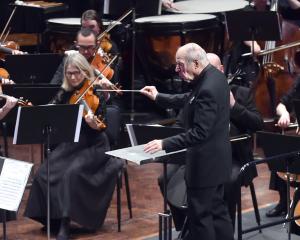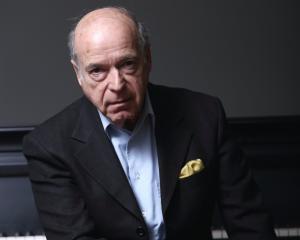Heleen du Plessis plans to head to the streets with her beloved cello to raise funds for cello education in Otago. Rebecca Fox discovers what is driving her plans.
Cellist Heleen du Plessis has big dreams. She wants to see Dunedin become ''the place'' to learn and perform the cello.
''Why can't a cello team be to Dunedin as the Highlanders are?'
'Mrs du Plessis, executant lecturer of cello at the University of Otago, believes the city should capitalise on the growing interest in and popularity of the instrument.
''People have realised how versatile it can be. It's not just relegated to classical music, it can do metal, rock, jazz. It has a range of abilities which has made it very popular.''
Groups such as the Portland Cello Project and Finnish metal band Apocalyptica highlighted that, she said. Yo Yo Ma was probably the most famous 21st century cellist, who led the movement into exploring crossover blends with other musical genres and cultures with the Silk Road Project .
''2Cellos, from Croatia, who performed here in Dunedin as part of the Elton John concert two years ago, is possibly the most popular cello phenomenon of our time!
''There were some stumbling blocks, mostly the costs of owning a cello and learning it at tertiary level. She hoped to overcome these problems by raising ''lots of money'' to fund aspiring young cellists and the teaching of the instrument.
''I will literally go to the streets myself to play.''
She had been inspired by United States President Obama's electoral campaign - the du Plessis' lived in the United States then - in which he raised funds through small donations from many rather than large donations from a few, she said.
Her first step five years ago was to reinvigorate the Cellists of Otago ensemble of musicians from the University of Otago, Southern Sinfonia, high schools and the community.
The group provided a platform for musicians from different institutions and the community to interact and perform to enhance their skills, and gave them exposure and experience.
It had already made waves, with international coverage in the New York City magazine Violoncello Foundation Newsletter, for its concert Cello for Peace (2014), dedicated to remembering the two world wars.
In March the ensemble was part of worldwide event Bach in the Subways and was the first group to perform works by Bach in St Paul's Cathedral at midnight, followed by other performances in several public places in Dunedin, to celebrate the musician's 330th birthday.
''Twelve cellos performing together produced an intriguing and appealing sound which has quickly and worthily gained wide recognition'', Marian Poole said in a review in the Otago Daily Times.
Pleased with the group's progress and having completed her Doctor of Musical Arts (DMA), Mrs du Plessis wanted to take things further.
She was concerned there was a lack of funds being put towards musical education for children, which would have a flow on effect in the future.
''They're not training music teachers for schools any more. We need to take responsibility.''
Many of the students she taught took her cello paper as part of a double degree and were studying law, psychology or engineering.
Many were able to supplement their incomes by playing in bars, at weddings and events or teaching, she said.
Even if these students did not go on to a classical career, they often contributed at a community level, teaching or playing freelance.
But in the long term there needed to be a concerted effort to attract these students to Dunedin and internships and scholarships were an important part of that, she said.
''It's an investment in the long term. There are not going to be tangible results in the short term. We need to create an environment and cultivate it.''
She wanted more people to have access to those options and not be prevented by a lack of funds.
Admittedly owning a cello was more expensive than many of the other instruments children learn to play, such as the flute, guitar or violin. A beginner's cello could cost about $2000, with an adult's instrument up around $8000.
Holding a cello competition or festival would also help attract international students to the city.
Alongside the cello ensembles and scholarships, she would like to hold workshops for beginning and intermediate players as well as sessions to assist teachers to teach cello.
Cellists of Otago was helping the cause with a concert this weekend to raise funds for the development of cello education in the city.
It would be highlighting the versatility of the cello by playing popular and classical themes from popular movies and TV, such as Game of Thrones, James Bond's Skyfall, Schindler's List, My Neighbor Totoro, The Bourne Identity, Fifty Shades of Grey and There will be Blood.
The group was also in the process of registering as a charitable organisation.
Mrs du Plessis' passion for the cello had been there from the days she fought her father to be able to play the instrument instead of the violin.
''I fall in love with the cello every day, it's a beautiful sound. I would carry my cello barefoot over mountains.''
To see
The Cellists of Otago ''Music from the Movies'', Sunday at 3pm at St Hilda's Collegiate School chapel.












